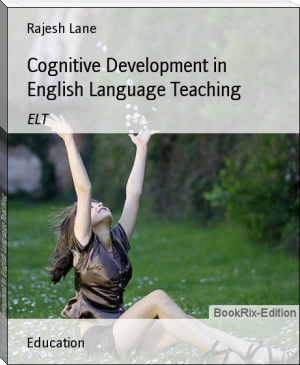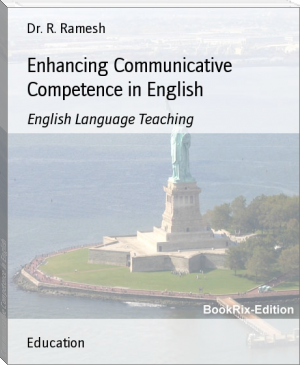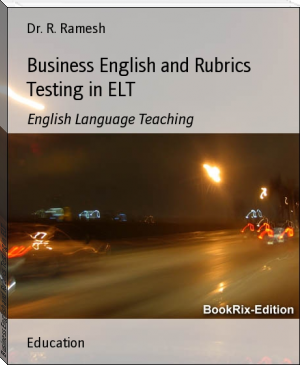Cognitive Development in English Language Teaching by Rajesh Lane (best desktop ebook reader .txt) 📕

Key Features
- promotes learner autonomy
- helps to familiarize usages than structures
- enables to induce creative competence
- helps to develop cognition
Read free book «Cognitive Development in English Language Teaching by Rajesh Lane (best desktop ebook reader .txt) 📕» - read online or download for free at americanlibrarybooks.com
- Author: Rajesh Lane
Read book online «Cognitive Development in English Language Teaching by Rajesh Lane (best desktop ebook reader .txt) 📕». Author - Rajesh Lane
(v) Cognitive development process was the suitable method to
acquire second language
Yes ( ) No ( )
(vi) Creativity was improved
Yes ( ) No ( )
(vii) Cognitive development process is vital to cope with any situation
Yes ( ) No ( )
(viii) Problem solving and insight formation of cognitive process have
been developed.
Yes ( ) No ( )
The following are the summary of their responses:
(i) The course was good - 70%
(ii) The course provided good opportunity
in exercising their speaking skills - 65%
(iii) The course helped them to speak and
Write effectively - 73%
(iv) Four skills of LSRW were improved by
Cognitive development process. - 68%
(v) Cognitive development process was the
Suitable method to acquire second language. - 74%
(vi) Creativity was improved - 75%
(vii) Cognitive development process is vital to
cope with any situation - 72%
(viii) Problem-solving and insight-formation of
Cognitive process have been developed. - 66%
The learners’ responses show what they felt. They have benefited from the cognitive development process. Therefore it was proved that the cognitive development is the competent method to acquire second language and to improve the problem-solving capacity (Creativity) in any context.
CHAPTER FIVE
SUMMING UP
Cognitive development is the most-effective process to expedite and better the second language acquisition of learners. After an analysis of 25 student samples to whom the emergent syllabus was given for study it was possible for the researcher to confirm that cognitive development is the prerequisite for language acquisition. The study was conducted among the UG students who were following the stereotyped rule-governing learning of mimicry and memorization in frustration and fear. In the learning of the language the creative process was ignored. It was felt that there was a strong need among the UG learners for rule free, fearless, creative speaking and writing according to the context.
The researcher used the cognitive development process to usher in the learner’s cognition and to acquire language through their insights and problem-solving capacity. During the study it was observed that the UG students could internalize the contextual use of language and their intuitive process of creativity with remarkable difference. This experience has helped them to tackle any situation. This process of cognitive development included the reasoning, problem-solving, creative speaking and writing and verbal and non-verbal abilities etc.. The researcher used 12 among the 26 tasks and they are the Information gap activities, Opinion gap activities, Role play, Simulation, Creative speaking, Reporting real events, Interviewing people, Free speaking, Carrying out many project, Making a newscast, Performing a play, Creating poetry, etc. The result from the research conducted on the UG learners points to a significant development. The tasks were set based on learners needs; their age, psychology, socio-cultural environments and their field of interest. Learners were allowed to talk freely without any rules. Their emotions were overtly conveyed. These are the two distinctive features involved in this study.
The researcher used both teacher created context and learner created context to improve learner’s cognition and reduce apprehension. Learners were asked to perform with peer group, in pairs and individually to enhance their creativity. The researcher was the facilitator to the learner’s performance. To organize the context and to develop the problem-solving capacity, emergent themes were circulated. When the learner came to encounter emergent context s/he could create the utterances which were totally new with their own emotion. In this context learner’s cognition played the vital role of problem solver. With this problem solving capacity their creativity was enhanced. However, when the learner dealt with festivals, ceremonies, accidents and incidents, they could create unconsciously. They had more to say. While the socio-economic-cultural contexts were brought into the classroom, unconsciously the learners could understand and create for various contexts.
Educational system generally adopts the behavioural psychology of learners which restricts the cognitive development process of learners. Behavioural psychology keeps the learners as passive receptors; there is no room for learner’s emotion and active process of creativity. The rules, instructions, grammar drills, exercises of every order are thrusted on the learners who cannot improve their cognition. Present teaching and learning situations totally rely on text, and no space for creativity. Owing to this reason it would be difficult for learners to compete with new situations. If the cognitive development technologies are effectively practiced, the problem of cognitive depression may not arise among the learners. So there is a strong need to develop cognition. Meta cognition and cognition are the two supreme aspects or components in the learner’s brain that helps understanding and creativity. When language is contextualized, the learners can understand the contextual use of language, because context determines the meaning. Every new situation is a problem, and the learner has to solve it.
Cognitive development process induced alacrity among the learners. During the cognitive development practice, the learners were eager to interact, it embellished the study. The ultimate aim of the study was to alleviate the misunderstanding of the learners on language and to improve their creativity to achieve effective communication.
Cognitive development process improved the four skills of Listening, Speaking, Reading and Writing (LSRW) of learners. Learner’s ability of creative speaking and writing were achieved to a greater extent. Researcher used peer group evaluation and individual evaluation to examine the learners cognition in performing the context.
In this book the researcher has concentrated on spoken communication, whereas other skills such as writing, reading skills are equally necessary to achieve communicative competence.
This book deliberately decided to turn the attention from fixed, rule-governed, passive teaching and learning conditions. Instead of this ongoing monotonous attention on grammar, the researcher used the rule free communicative process. The researcher could understand from the study conducted that the conscious use of rules will hinder effective communication. If conscious use of rule is stressed upon the whole attention would be on the accurate use of rules. Consequently, the communication gets less attention. That is the reason why the learner cannot perform well. Here the unconscious application of rule is needed to communicate effectively. The researcher used the rule-free communication among the learners to enable them perform without any restriction. In the classroom performance, the learners could acquire the contextual use of language from researcher, and his/her peer group. In the initial stage the learners committed mistakes and it was corrected by them intuitively, and therefore it led to effective communication. Eventually learners could speak and write creatively to any context.





Comments (0)